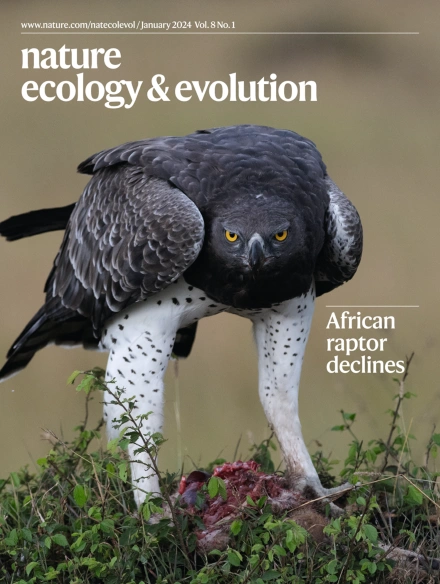No refuge for Amazon birds
IF 13.9
1区 生物学
Q1 ECOLOGY
引用次数: 0
没有亚马逊鸟类的避难所
未受人类直接退化干扰的森林通常被认为是气候避难所,可以保护生物免受气候变化最严重的影响。然而,最近的证据表明,在看似原始的热带雨林中,长寿物种的数量正在下降。对此的一种解释是,适应热带森林稳定小气候的物种以牺牲生殖产出为代价进化出了更长的寿命,因此它们的种群动态可能对环境的微小变化很敏感。Wolfe等人在《科学进展》杂志上撰文,通过分析巴西20个未受干扰的森林地点的29种亚马逊鸟类的27年捕获-标记-再捕获数据集,验证了这一假设。结果表明,在此期间,旱季平均气温上升了1℃,旱季平均降雨量下降了10 mm。与此同时,20种鸟类的年表观存活率(在同一研究区域内存活和捕获)显著下降,高温对寿命较长的鸟类的不利影响大于寿命较短的鸟类。旱季降雨量的暂时增加也与21种鸟类年表观存活率的显著提高有关,并且在寿命较长的物种中,这种正趋势再次增强。研究结果表明,亚马逊地区的鸟类群落可能没有能力适应快速变化的环境。原始参考文献:Sci。ad11, eadq8086 (2025)
本文章由计算机程序翻译,如有差异,请以英文原文为准。
求助全文
约1分钟内获得全文
求助全文
来源期刊

Nature ecology & evolution
Agricultural and Biological Sciences-Ecology, Evolution, Behavior and Systematics
CiteScore
22.20
自引率
2.40%
发文量
282
期刊介绍:
Nature Ecology & Evolution is interested in the full spectrum of ecological and evolutionary biology, encompassing approaches at the molecular, organismal, population, community and ecosystem levels, as well as relevant parts of the social sciences. Nature Ecology & Evolution provides a place where all researchers and policymakers interested in all aspects of life's diversity can come together to learn about the most accomplished and significant advances in the field and to discuss topical issues. An online-only monthly journal, our broad scope ensures that the research published reaches the widest possible audience of scientists.
 求助内容:
求助内容: 应助结果提醒方式:
应助结果提醒方式:


